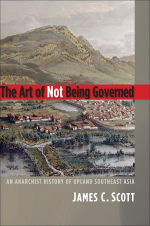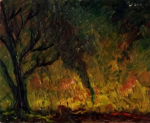Vietnam
James C. Scott
The Art of Not Being Governed
An Anarchist History of Upland Southeast Asia [en]
For two thousand years the disparate groups that now reside in Zomia (a mountainous region the size of Europe that consists of portions of seven Asian countries) have fled the projects of the organized state societies that surround them—slavery, conscription, taxes, corvée labor, epidemics, and warfare. This book, essentially an “anarchist history,” is the first-ever examination of the huge literature on state-making whose author evaluates why people would deliberately and reactively remain stateless. Among the strategies employed by the people of Zomia to remain stateless are physical dispersion in rugged terrain; agricultural practices that enhance mobility; pliable ethnic identities; devotion to prophetic, millenarian leaders; and maintenance of a largely oral culture that allows them to reinvent their histories and genealogies as they move between and around states.
In accessible language, James Scott, recognized worldwide as an eminent authority in Southeast Asian, peasant, and agrarian studies, tells the story of the peoples of Zomia and their unlikely odyssey in search of self-determination. He redefines our views on Asian politics, history, demographics, and even our fundamental ideas about what constitutes civilization, and challenges us with a radically different approach to history that presents events from the perspective of stateless peoples and redefines state-making as a form of “internal colonialism.” This new perspective requires a radical reevaluation of the civilizational narratives of the lowland states. Scott’s work on Zomia represents a new way to think of area studies that will be applicable to other runaway, fugitive, and marooned communities, be they Gypsies, Cossacks, tribes fleeing slave raiders, Marsh Arabs, or San-Bushmen.
In accessible language, James Scott, recognized worldwide as an eminent authority in Southeast Asian, peasant, and agrarian studies, tells the story of the peoples of Zomia and their unlikely odyssey in search of self-determination. He redefines our views on Asian politics, history, demographics, and even our fundamental ideas about what constitutes civilization, and challenges us with a radically different approach to history that presents events from the perspective of stateless peoples and redefines state-making as a form of “internal colonialism.” This new perspective requires a radical reevaluation of the civilizational narratives of the lowland states. Scott’s work on Zomia represents a new way to think of area studies that will be applicable to other runaway, fugitive, and marooned communities, be they Gypsies, Cossacks, tribes fleeing slave raiders, Marsh Arabs, or San-Bushmen.
Mèo Mun
The Broken Promises of Vietnam
[en]
Vietnam 2021, the mood in the air seems to be that of optimism. The government’s relentless pursuit of a Zero-COVID strategy has won them widespread approval both domestically and internationally. The economy managed to squeeze out positive growth whereas many of its neighbours suffered a decline from the pandemic. Yet underneath all this bravado, one could sense that something is amiss. There’s this nagging feeling that no one seems to be able to put a finger on. Almost as if, there is a spectre haunting Vietnam, the spectre of communism — the true kind without any bells and whistles.
Mèo Mun
The Fight for Partial Freedom in Vietnam
And how liberals are the only one pretending to care [en]
Western leftists, communists, and anarchists alike routinely call for ‘unity’ with the authoritarian oppressors in their favourite ‘socialist’ states. They value a cheap, doomed-to-end-in-failure unity with the statists, the genocide deniers, and the red reactionaries, more than the well-being and liberation of marginalised groups.
Mèo Mun, Xuân Rayne
Interview with Xuân Rayne
Vietnamese, Anarchist, Sex Worker [en]
We interviewed Xuân Rayne, a Vietnamese anarchist and non-binary sex worker based in the United States for their insights into the intersection of their identities, the paths for international solidarity among sex workers, and how workers in general can stand with sex workers. Xuân uses any/all pronouns.
Ngô Văn
In the Crossfire
Adventures of a Vietnamese Revolutionary [en]
Although the Vietnam War is still well known, few people are aware of the decades of struggles against the French colonial regime that preceded it, many of which had no connection with the Stalinists (Ho Chi Minh’s Communist Party). The Stalinists were ultimately victorious, but only after they systematically destroyed all the other oppositional currents. This book is the story of those other movements and revolts, caught in the crossfire between the French and the Stalinists, told by one of the few survivors.
David Watson, Richard Drinnon
Looking Back on the Vietnam War
History and forgetting [en]
Vietnamese commissars will deliver up resources and cheap labor to international corporate capital, sometimes to the very same exploiters they spent thirty years fighting. It should be no surprise that Vietnamese army veterans are beginning to ask what exactly it was they fought for.
Mèo Mun, The Final Straw Radio
Mèo Mun, Anarchist Views from Vietnam
[en]
Mèo Mun is an anarchist collective working to make anarchist materials and ideas more accessible to a Vietnamese audience, together with providing an analysis of social struggles from a Vietnamese anarchist lens. Over the next hour you’ll hear three collective members, Mai, Will and tùng share their critiques of leftist misrepresentations of the Vietnamese State as Socialist, lasting impacts of imperialism and war on populations of Vietnam, the centering US imaginaries of Vietnam, the struggles of working class people in general (and queer folks and sex workers in particular) in Vietnam, nationalism promoted by the government and other topics.


